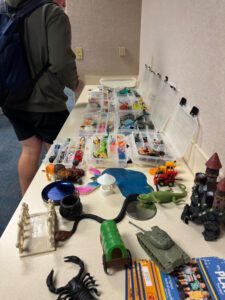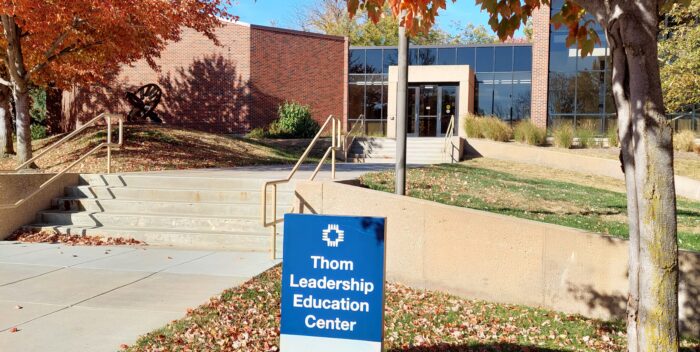Registered play therapist shares stories of help and healing for kids, families
The Social Science Club hosted a presentation by Janice Sherman in the Thom Leadership Education Center on Nov. 12. Photo: Nora Betts
By Kai Olbrich
Registered play therapist Janice Sherman believes that, despite the difficulties and stresses of her job, it is all worth it when she sees kids heal and families come together.
Concordia’s Social Science Club hosted Janice Sherman in the Thom Leadership Education Center on Nov. 12 to speak about the value of play therapy and how she has seen it help heal, protect, and build confidence in kids.
Sherman is a licensed Independent Mental Health Practitioner and Registered Play Therapist. She earned her bachelor’s degree at Doane University and attended graduate school at Wichita State.
Sherman got into play therapy after a foster care experience led her to seek out ways to better help troubled children.
“You know, we’ve done foster care, and, we had a young man that stayed with us who was very aggressive, very violent,” she said. “And we’re not able to keep him in our home because of the safety risk. And I just felt like, what more could we have done to help him? You know, what were we missing? And that’s really what led me to explore being a therapist in general. And the play therapy part of it, I knew I wanted to work with children. So I kind of researched certain therapies that would allow me to be trained in that.”

Sherman had each audience member select a mini sandbox and figurines to illustrate one type of play therapy. Photo submitted by the Social Science Club
Sherman began her Tuesday evening lecture by having everyone select a miniature sandbox and some figurines to put in it. This is an example of the most common form of play therapy Sherman uses.
Sherman’s office in Glenvil, Nebraska, is set up like a children’s playroom with a chalkboard, puppet theater, toy cars, and sand. Sherman said that the sand helps kids to express their feelings, even if they are not able or willing to verbalize it. They can build scenes and act out what they have experienced. She said that “toys become their voice.”
Sherman gave the example of a child with Down Syndrome who suffered abuse at school. Through play therapy, they were able to work through the trauma he suffered, and he eventually made it back to his old school.
Sherman said she has been an expert witness in the courtroom many times. This involves testimony, backing up her credentials, and writing statements. She said that, although it is very hard, it is rewarding in the end.
“You know, working those are really hard cases,” she said. “Especially the ones with Child Protective Services when you’re working to reunite families and process trauma. Those are really hard cases to work, but when healing happens and they’re able to together as a family, and be healthy together, that’s absolutely the best part,” Sherman said.
There are some unique challenges to working with kids, like when they have excess energy or are unable to control aggressive behavior, she said.
“[Children are] active,” said Sherman. “I mean, if you’re working with adults you’re usually not having to, like, chase them around or dodge. I’ve been hit, I’ve been bit, I’ve been kicked… But again, you know, the reward is when you see those behaviors go away and they’re replaced with emotional words and language, and you see them get better.”
Sherman has seen firsthand how play therapy can help kids who have suffered abuse or trauma or have mental or behavioral issues. Sherman believes that becoming a therapist is a worthy endeavor.
“I would say go for it,” she said. “You know, there are so many different ways to help people heal. Music, arts, emotion, play, those are all very emotionally involved. So, they’re just one more way to be able to connect and do that important work,” Sherman said.























